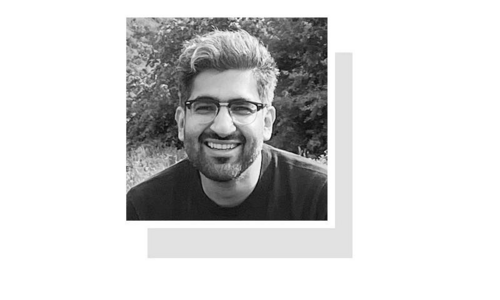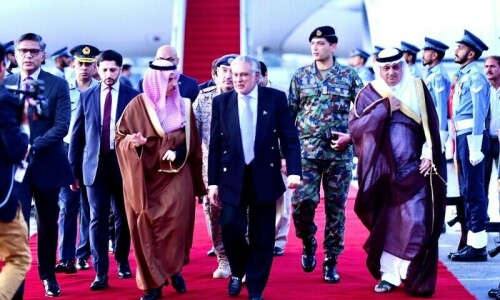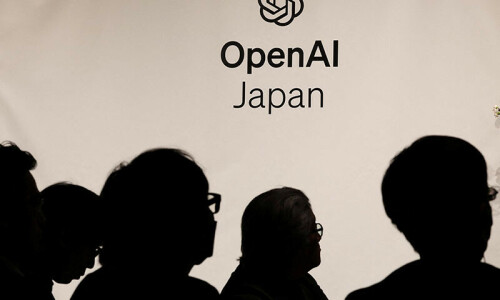
A GOVERNMENT’S performance should determine its political fate, but measuring this is a tricky affair. Governments usually tend to quantify and highlight their achievements to influence electorates. However, some other factors also bear upon voters’ opinions that can cause surprising results — among them, the mantra of ‘change’, which is gaining currency in Pakistan’s electoral politics.
In a sense, this is normal; in the run-up to an election, the opposition promises something different, ie change, while the incumbent defends the change it has brought about. But what if the outgoing ruling party also builds its campaign on the mantra of change? This may not be too unintelligible in Pakistan, where more than one power centre vies to rule the country. A lack of clarity on the question of sovereignty, or supremacy, also creates an imbalance in power and politics. In such situations, nobody takes responsibility for failures.
The PML-N is apparently building its campaign on some constitutional fundamentals. Its leadership believes it can convince voters that real change can happen only through sanctity of the vote. Its arch-rival, the PTI, is projecting the former as corrupt and non-visionary, and orienting its own campaign around ‘changing’ the political status quo it believes has been mainly buttressed by the PML-N and the PPP. Meanwhile, while nationalist parties employ the slogan of transparent resource distribution, religio-political parties present a religion-based model of ‘change’.
Summed up, the entire political discourse of change in Pakistan consists of three slogans: dynastic politics is a curse and only new leadership can bring about change; only civilian supremacy can ensure a change, or; only religious actors can bring about change in a country established in the name of Islam. One can, however, contest whether or not these mantras resonate with people’s aspirations.
Does political sloganeering align with the majority’s aspirations?
The political intelligentsia usually constructs such slogans in the context of the country’s power dynamics. The urban middle classes, however, have developed an idea of change based on their own socioeconomic and cultural contexts, which is also cause for many ideological and political ambiguities we see in these classes. That dichotomy notwithstanding, parties are also struggling for compatibility with the political demands of the rural majority. The PPP, once considered the voice of the rural and oppressed communities, is also caught up in a largely urban-focused ‘change’ trap.
Academicians and political scientists, too, have habitually measured political changes through the urban middle classes. Dr Ammara Maqsood’s The New Pakistani Middle Class analyses how the urban middle class, unlike Pakistan’s other middle classes, is deeply engaged in the question of national identity and the struggle for compatibility between tradition and modernity. Their view of tradition, mainly derived from religion, is quite narrow, she posits, yet they desire a leadership with a modern outlook and sensibility.
Demographically, however, they cannot surpass the majority of the lower middle classes. Pakistan’s middle class is diverse, visible in the different income and sociocultural shades in urban areas. A survey conducted by Bahauddin Zakariya University reveals that voters’ income profiles influence their electoral choices. The study showed that 38.3 per cent of voters (13.1pc rural, 20.9pc urban and 4.3pc semi-urban) voted to support the democratic process in the 2008 election. However, 14.3pc of respondents believed that no change in Pakistan is possible through the ballot. The study revealed that those whose incomes ranged between Rs6,000 to Rs24,000 per month were more enthusiastic about change through the electoral process.
Another study conducted by political scientist Muhammad Waseem explains that people participate actively in electoral processes because of their increasing awareness of the importance of delivery systems. Several studies have also suggested that uneven urbanisation in Pakistan is imposing a burden on existing urban infrastructure services. Dr Ishrat Husain sees Pakistan’s urbanisation as part of a phenomenon of ‘informalisation’ of the economy. He explains how internal migrants from Pakistan’s rural areas are absorbed in the informal economy.
This new urban class is struggling to maintain its balance among the lower middle classes. The slogans of better infrastructure and public service delivery are more attractive to them in comparison to complex political issues. After the rural population, this segment of the urban middle classes matters most in electoral politics as it can play a decisive role in the outcome of the election.
With more than a hundred political parties registered with the Election Commission of Pakistan, and each of these parties with their own promises of change, the question is: are their slogans of change compatible with the kind of change the majority of Pakistanis desire?
The writer is a security analyst.
Published in Dawn, June 22nd, 2018









































